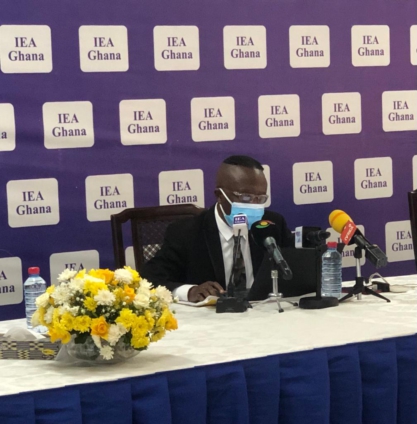The argument over the proposed 1.75% Electronic Transaction Levy in the 2022 Budget and Economic Policy will not go away soon, as the Institute of Economic Affairs is proposing a 0.5% for the levy.
This it believes will ease the burden on consumers and avoid negative reactions from the public.
The IEA claims the 1.75% levy is too high, as the telecom firms already charge one percent as service fees.
“Whereas we think the E-Levy represents an innovative idea to scale up revenue mobilisation, we have some reservations”, Director of Research, Dr. John Kwakye said.
“Customers will be paying the 1.75% levy on momo transactions in addition to the 1.0% already levied by Telcos, bringing the total levy to 2.75%. This is very high. To ease the burden on customers and avoid any negative reactions, we would propose 0.5% for the E-Levy, bringing the total levy to 1.5%”, Dr. Kwakye explained.
“We do not see why it is proposed to link part of the E-Levy to the targeted objectives. This will amount to further revenue earmarking in addition to the existing earmarking related to the statutory funds, etc., which introduces further rigidity into government expenditure. We would rather pay the proceeds of the E-Levy into the Consolidated Fund pool to be disbursed in a flexible manner”, he further said.
The IEA Director of Research continued, saying “the E-Levy has the potential to undermine the considerable effort put in by this government to digitise and formalise the economy and, in particular, promote a cash-less economy, as, by seeking to avoid the E-Levy, many people and businesses will revert to cash transactions, with all its attendant risks.”
The proposed tax measures by government are projected to make a significant impact in 2022, as total revenue is expected to go up by 43% to ¢100.5 billion or 20.0% of GDP, from ¢70.3 billion or 16.0% of GDP in 2021. However, after the initial sprout in 2022, the IEA pointed out that the rate of increase seems to slow down markedly during 2023-25.
“In fact, in GDP terms, revenue stays almost flat at 20.0% in 2023, 20.5% in 2024 and 20.3% in 2025”, it mentioned.
Even at 20%, Ghana’s revenue/GDP still falls significantly short of the average of about 30.0% for its middle-income peers.
“It is our expectation, therefore, that more effort would be made to further scale up revenue over the medium-term”, the IEA advised.
It also drew attention to the enormous revenue potential derivable from the country’s natural resources.
“In the past, we have given away the chunk of this revenue to foreign investors through concession contracts. We can only unleash the revenue potential from our natural resources for our development if we ensure that fiscal regimes for their exploitation provide maximum benefits to Ghana and not to investors as previous regimes have done.”
Latest Stories
-
I want to focus more on my education – Chidimma Adetshina quits pageantry
2 hours -
Priest replaced after Sabrina Carpenter shoots music video in his church
2 hours -
Duct-taped banana artwork sells for $6.2m in NYC
3 hours -
Arrest warrants issued for Netanyahu, Gallant and Hamas commander over alleged war crimes
3 hours -
Actors Jonathan Majors and Meagan Good are engaged
3 hours -
Expired rice saga: A ‘best before date’ can be extended – Food and Agriculture Engineer
3 hours -
Why I rejected Range Rover gift from a man – Tiwa Savage
3 hours -
KNUST Engineering College honours Telecel Ghana CEO at Alumni Excellence Awards
3 hours -
Postecoglou backs Bentancur appeal after ‘mistake’
4 hours -
#Manifesto debate: NDC to enact and pass National Climate Law – Prof Klutse
4 hours -
‘Everything a manager could wish for’ – Guardiola signs new deal
4 hours -
TEWU suspends strike after NLC directive, urges swift resolution of grievances
4 hours -
Netflix debuts Grain Media’s explosive film
5 hours -
‘Expired’ rice scandal: FDA is complicit; top officials must be fired – Ablakwa
5 hours -
#TheManifestoDebate: We’ll provide potable water, expand water distribution network – NDC
5 hours

